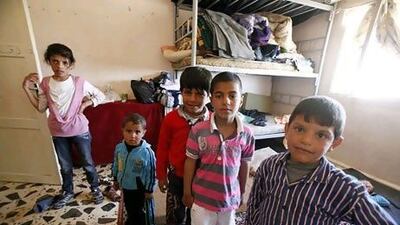RAMTHA, JORDAN // Abu Muhammad, a 27-year-old Syrian activist, has one persistent thought running through his mind.
He wants to return to his Syrian hometown of Deraa, which he fled earlier this year, and help the Free Syrian Army (FSA), a loose coalition of armed rebels fighting the regime of President Bashar Al Assad.
"I don't feel I am doing my share towards the revolution," he said in an interview last week near Ramtha . "It is only a matter of time and I will return to help the FSA in any possible way. I can ferry the injured and deliver bullets to the army."
Wanted by police in Syria for participating in protests, Mr Abu Mohammed, like other refugees quoted in this story, asked that his real name not be used.
He is convinced that the armed rebels are the only legitimate Syrian opposition.
Like many Syrian activists and rebels, Mr Abu Muhammed says the Syrian National Council (SNC), which presents itself as Mr Al Assad's primary opposition, does not represent them. They complain that the SNC has failed to provide rebel fighters with the cash and weapons needed to overthrow the Syrian regime.
Since its inception a few months after the revolution began 15 months ago, the SNC has been plagued by political wrangling.
Its head, Burhan Ghalioun, stepped down last week amid threats by an activist group, the Local Coordination Committee, to pull out of the council because it's been so ineffective and the Muslim Brotherhood is gaining so much influence in the organisation.
The Syrian refugees and activists in Jordan say they pay little attention to the SNC anymore.
"It doesn't affect the revolution because the rebels do not depend on the SNC," Mr Abu Muhammad said. "The regime will only fall by force."
Others agree.
"The council is the worst thing that has ever happened to the revolution," said Abu Hadi, another activist who rents a sparsely furnished house in the town of Mafraq near the border. "The SNC did not make a national unity among the opposition abroad. It has only deepened divisions."
Sitting on a mattress and surrounded by his wife and six children, Mr Abu Hadi said rebels are counting only on aid they receive from wealthy Syrian expatriates in Saudi Arabia and the Gulf. The SNC is useless, he said.
He also is concerned about the Muslim Brotherhood's influence in the council.
"We do not want the Brotherhood because if they make it to power, it will deal a blow to Syrians. They will enforce Sharia . they would whip people. We are in the 21st century", he said. But the failure of the SNC does not mean that a post-Assad Syria would lack leadership, activists say.
"There are prominent figures in Syria working for their country's interests including army generals who did not announce their defections. We want these people to represent us", said Abu Baker Al Hourani, a 40-year-old activist who is in constant contact with the FSA.
For now, the rebels back home in Syria are organising their own opposition groups inside different cities.
"The solution is now with the rebels", said Abu Suhayb, a 30-year old activist.
smaayeh@thenational.ae

Syrians in Jordan: only armed rebels can oust Assad
Many Syrians say the Syrian National Council does not represent them because it has failed to provide rebel fighters with the cash and weapons they need.
Most popular today
